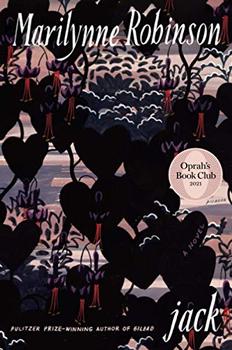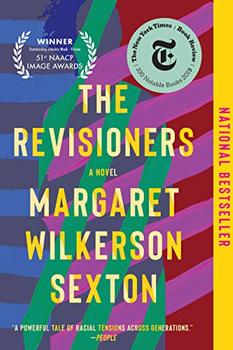Summary | Excerpt | Reading Guide | Reviews | Beyond the book | Read-Alikes | Genres & Themes | Author Bio

If you are a fan of Marilynne Robinson's Gilead series, you already know who Jack is. Chances are, you already know his story too. Jack is the enigmatic ne'er do well who disrupts the peace of Gilead's quiet narrator, Rev. John Ames, with his return to town after a 20-year absence. In that first novel of the series, we learn that though he is the beloved (perhaps most beloved) son of the narrator's friend and fellow cleric, Jack has done nothing but bring shame to his family with his childhood stream of malicious pranks, petty larcenies and deliberate provocations. The novel Jack traverses the intervening years between his departure and return to Gilead, painting a portrait of an infinitely flawed and complicated man grappling with what it means to truly love.
If Robinson has written beautifully about family life and the domestic love that exists between father and son in Gilead, she proves equal to the task of probing romantic love in Jack. As is the case with her other works, Jack begins slowly and with such ordinary detail that an impatient reader might not make it very far. The novel opens in the early 1950s with Jack, who is white, and Della, a young Black woman, walking through a graveyard over the course of a night. They discuss life and art and what it might mean to start over in a world without rules and restrictions. At times, it's difficult to know where Robinson is taking us with this extended dialogue. However, there are rewards for the reader's patience. As Jack and Della's love story unfolds, those ordinary details (the basics of which readers of Gilead and its successor Home already know) layer in upon one another, creating a prism for the mysteries of love, such as how and why two particular people fall for one another. For Della, the reason is simple. She says:
But once in a lifetime, maybe, you look at a stranger and you see a soul, a glorious presence out of place in the world. And if you love God, every choice is made for you. There is no turning away. You've seen the mystery—you've seen what life is about. What it's for. And a soul has no earthly qualities, no history among the things of this world, no guilt or injury or failure. No more than a flame would have. There is nothing to be said about it except that it is a holy human soul. And it is a miracle when you recognize it.
For Jack, the answer is much more complicated. His story of falling in love with Della seems tied to every other (failed) love story in his life and his continual striving to leave "fragile things" undamaged. When Jack sees Della for the first time he is just out of prison, dressed in a suit that makes him look like his preacher father, and on his way to his mother's funeral. In this moment, Jack chooses to step into Della's mistaken impression that he is a preacher himself, rather than to deal with the difficult emotions that have come with his years of disappointment and thwarted promise. This is not to say, however, that Jack doesn't truly love Della. While some might interpret his relationship with Della and his inability to leave her alone despite the dangers of being an interracial couple as part of his normal, destructive compulsion, others might see their relationship as a final resolution to his ongoing question of faith and his long-standing rejection of unconditional love. When Jack finds Della in his room, he thinks, "…there she was, quietly asleep, blessing his shabby bedclothes with her peacefulness, her soft breathing. Blessing the whole barren room with her amazing trust. There was dread, yes, but grace, too."
And Della is indeed a blessing. One of the most compelling aspects of the novel is how equally yoked, insofar as the times allowed, Della is to the singular Jack. In many ways, she is a reflection of him. Like Jack, she is the child of a minister, and because of her innate intelligence, she is a symbol of hope for her family. Della is also deeply unsatisfied with the world as it exists. As a child she is brought to tears by the notion that she, because of her skin color, will not be able to safely visit Wyoming, a place of wild freedom in her imagination. This innate dissatisfaction with the world later makes her the perfect "conspirator" with Jack as she also actively pursues a relationship that will most likely get her fired or thrown in jail. Della is the one who declares them "married," and in the aftermath she holds Jack's hand and says, "You're not doomed. Neither am I. We've chosen a difficult life, that's all."
Despite the deep connections to the other books in the Gilead series, readers don't need to have read any of them to appreciate Jack. They can lose themselves in Robinson's beautiful language and boundless empathy for her characters just as easily. However, if readers are returning to the world of Gilead, they will find that Jack, and his actions, remain the axis upon which so much of the emotional weight of this world spins.
![]() This review was originally published in The BookBrowse Review in September 2020, and has been updated for the
April 2021 edition.
Click here to go to this issue.
This review was originally published in The BookBrowse Review in September 2020, and has been updated for the
April 2021 edition.
Click here to go to this issue.

If you liked Jack, try these:

by Margaret Wilkerson Sexton
Published 2020
Following her National Book Award–nominated debut novel, A Kind of Freedom, Margaret Wilkerson Sexton returns with this equally elegant and historically inspired story of survivors and healers, of black women and their black sons, set in the American South.

by Marilynne Robinson
Published 2009
Home parallels the story told in Robinson's Pulitzer Prize-winning Gilead. It is a moving and healing book about families, family secrets, and the passing of the generations, about love and death and faith.
Your guide toexceptional books
BookBrowse seeks out and recommends the best in contemporary fiction and nonfiction—books that not only engage and entertain but also deepen our understanding of ourselves and the world around us.